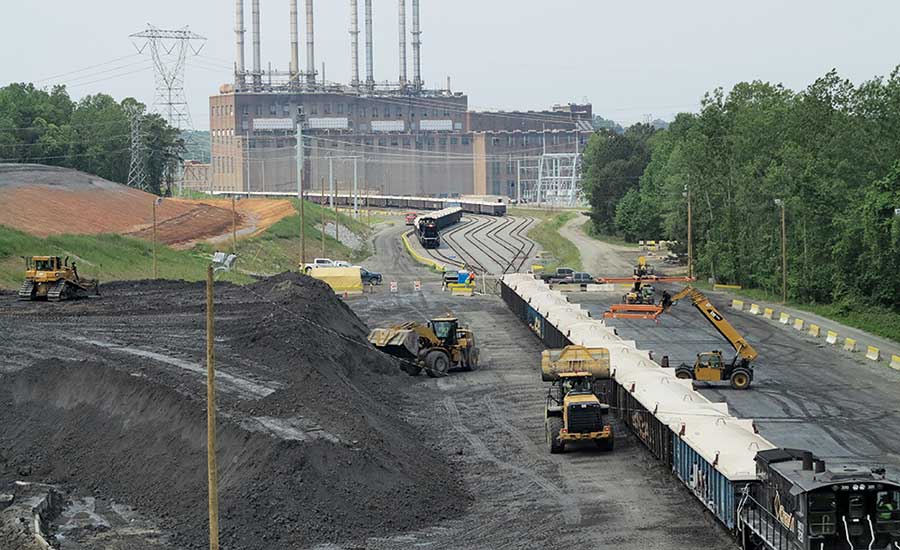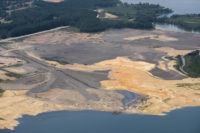Duke Energy Appeals N.C. Order to Excavate Nine Coal Ash Pits

Trains are loaded with coal ash from the closed Riverbend station in Mount Holly, N.C.
PHOTO COURTESY OF DUKE ENERGY
Duke Energy Progress said April 11 it will appeal the North Carolina Dept. of Environmental Quality’s order issued earlier this month to excavate nine remaining large coal ash pits at six power plants in the state and move ash to lined landfills; the firm claims the new mandate at sites previously deemed low-risk will cost up to $5 billion to implement.
In a statement, Duke said the cost to remove and offsite dispose of the waste would impose a financial burden on power customers and on the Carolinas economy of the Carolinas. It called the closure decision the “most expensive and disruptive” option possible and that DEQ did not fully consider the science and engineering when making its decision.
Duke’s current plans call for removing water from the coal ash and covering the impoundments, cap-in-place, which it says provides similar protections to removing the waste to a lined landfill.
State environmental officials said they ordered the change in Duke’s coal-ash cap-in-place plan April 1 after conducting a rigorous scientific review and public listening sessions in nearby communities.
The nine impoundments are located at Allen, Blews Creek, Cliffside/Rogers, Marshall, Mayo and Roxboro coal-fired plants.
“[The Department of Environmental Quality] has determined excavation of all six sites is the only closure option that meets the requirements of the Coal Ash Management Act,” DEQ said. Ash residue must be moved to dry, lined storage away from waterways. “The science points us clearly to excavation as the only way to protect public health and the environment,” secretary Michael Regan said in a statement. Duke also will have the option to propose beneficial-use options such as recycling.
Duke's appeal is being filed to a state administrative agency. “Science and engineering support a variety of closure methods including capping in place and hybrid cap-in-place as appropriate solutions,” the company said, saying the agency has ruled the existing sites as low-risk.
A bill introduced in the North Carolina General Assembly on April 3 would require large coal-ash impoundments to be managed as high risk and evacuated rather than capped in place. Other bills introduced since the DEQ order would bar electric utilities from recovering from its customers the cost of coal ash management and cleanup of illegal spills from coal ash ponds. The two-year session began in January.
Duke would not respond to questions about the pending legislation. “The Utilities Commission is the body charged with determining rates based on a robust and public review of the money we spend to operate the system and to comply with regulations,” a spokesman said.
Duke’s plan for the 29 open coal ash impoundments in North Carolina was to excavate 22 small ones and move dried coal ash to dry-lined storage. At the remaining large ponds, it planned to remove water from the waste and cap the impoundments in place with an impervious liner. The remediation plan was to be completed by 2029.
The U.S. Environmental Protection Agency has said that both remediation methods are safe for health and the environment while providing similar environmental protection, but cap-in-place is much less expensive, Duke said. The utility has excavated about 18 million tons of coal ash so far and in January stopped sending ash and wastewater to all basins, well in advance of federal rules, the company said.
A 2016 law required Duke to identify three sites across the state for ash recycling projects, making 900,000 or more tons of material available each year. The first unit near Salisbury is expected to be online in spring 2020, the second in late 2020 and the third in 2021, Bill Norton, a company spokesman, told ENR. The processing units will remove carbon from the ash. “To make coal ash more suitable for recycling, Duke is making additional significant investments in technology designed to reprocess coal ash from basins,” the company said.
The Southern Environmental Law Center had sued Duke over the plan to cap in place the nine remaining impoundments and said the only way to protect North Carolina is to remove coal ash from unlined pits. “Duke Energy should accept this decision,” Frank Holleman, SELC senior attorney, said in a statement.
Duke Energy must submit final excavation plans for the nine sites to DEQ by Aug. 1 and include where excavated coal ash will be taken. The utility said it will take decades to complete the projects, stretching well beyond the current state and federal deadlines for closures, and will add up to $5 billion to the current estimate of $5.6 billion for the Carolinas.
Earth Justice, in a new analysis of groundwater near U.S. coal-fired plants, says that Duke’s Allen plant, where coal ash is deposited below the water table, is the second most contaminated coal ash site in the country.
Duke Energy disputes those rankings as misleading and says tests show drinking and recreational water supplies around Allen Steam Station and its other North Carolina facilities remain safe from coal ash impacts, and modeling shows they’ll continue to be safe in the future.





